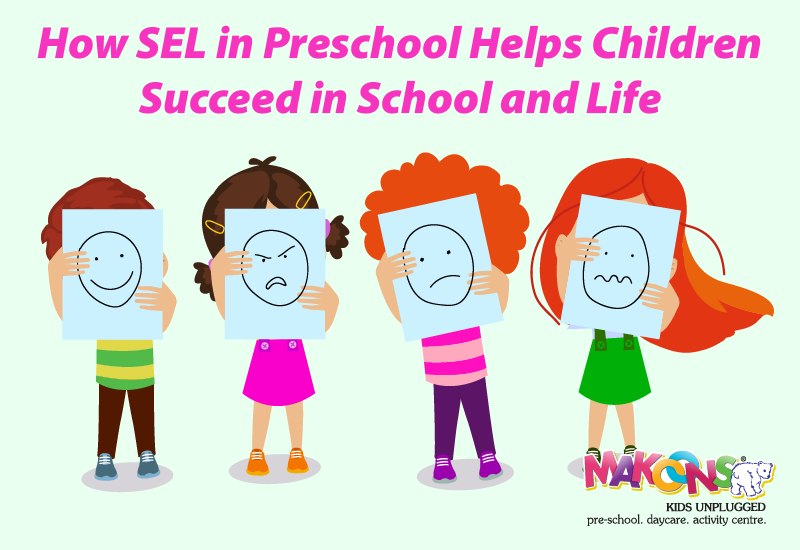
When we think of preschool, we picture tiny chairs. Bright toys. Snack time chaos. Kids giggling during storytime.
It’s sweet. Messy. Loud. All kinds of wonderful.
But under all that?
Something much bigger is happening.
It’s called SEL—Social Emotional Learning.
And honestly? It’s one of the most powerful things we’re giving kids right now.
Let’s Get Real
Preschool isn’t just about ABCs. Or counting jellybeans. Kids aren’t just learning colors or how to hold a pencil.
They’re learning how to be.
How to feel something—and name it.
How to connect. Handle tough stuff. Build friendships. Be kind. Be okay.
That’s SEL. In its truest, messiest form.
So, What Is SEL Anyway?
Social Emotional Learning teaches kids about emotions. Theirs. Others’. Teaches them to manage those big feelings. And make choices that are actually… good.
Sounds simple? Nope. It’s deep.
Think about it.
A 4-year-old who says, “I’m mad”—instead of hurling a toy across the room? That’s huge.
A kid who comforts a crying friend instead of staring awkwardly? Yep. That’s SEL too.
They’re not just learning to be “nice.” They’re learning how to be human. Whole humans.
Why It Actually Matters
Picture this.
A kid loses a game. He feels the burn. But instead of storming off? He shrugs. Tries again.
A girl walks into class feeling nervous. But she says it out loud. Breathes. Joins the group anyway.
These kids? They’re not just surviving preschool. They’re ready for life.
And hey—science agrees. Studies show that children with strong emotional skills:
Do better academically
Have fewer behavior problems
Are less anxious
Grow into adults who thrive—in jobs, in relationships, in life
It’s like giving them a secret superpower.
Only—it shouldn’t be a secret.
Real Benefits? Oh, There’s Plenty
Self-Awareness
Little kids learn to notice what’s going on inside.
“I’m sad my drawing tore.”
“I feel proud ‘cause I helped clean up.”
That’s the first step—naming the emotion. Game changer.
Emotional Control
Preschoolers and tantrums? A classic combo.
But with SEL? They get tools. Deep breaths. “I need space.” Words instead of wails.
The meltdowns don’t vanish—but now they understand them.
Better Friendships
They learn to wait. To listen. Not grab. Not yell.
These aren’t “manners.” They’re life skills.
And they’re taught—through stories, role-play, and just plain everyday messes.
Wiser Choices
Even little kids face choices.
Push or pause? Say “sorry” or storm off?
SEL teaches pause. Teaches that tiny second before action.
That second? It’s gold.
What SEL Looks Like in Preschool
Imagine this:
A soft corner in the classroom. Pillows. Quiet toys. A poster with cartoon faces—happy, sad, mad, scared.
A kid sitting there, holding a stuffed animal. Breathing slowly.
A teacher kneels nearby. Calm voice. “Looks like you’re having a tough moment. Want to talk?”
Another group is using puppets. One puppet just knocked over a tower. The other one says, “That made me mad, but I’ll build again.”
No lectures. Just stories. Games. Real life in miniature.
And the teacher? She messes up sometimes too. Says sorry. Models grace. Patience. Kids notice. Kids copy.
They always do.
And the Long-Term Payoff?
People say, “Oh, emotional stuff? That’s extra.”
No. It’s essential.
Want kids to succeed in school?
They need to focus. Take turns. Handle frustration. Work in groups.
Want them mentally strong?
They need to bounce back. From failure. From fights. From being left out.
Want them job-ready one day?
Then they need empathy. Flexibility. Team spirit. Conflict skills.
It starts right here. In preschool. With SEL.
But Wait—Parents, You Matter Too
It doesn’t end at the school gate. SEL continues at home. Grows there, actually.
Here’s how:
Label feelings: “You look frustrated.”
Celebrate effort: “You tried really hard to stay calm.”
Model your tools: “I need a minute. I take a breath when I’m mad.”
Ask open questions: “How do you think she felt when that happened?”
Stick to routines: They help kids feel safe. Predictable = peace.
No need to be perfect. Just be real.
Your kid’s watching. Learning. Every day.
One Last Thing
Not every child is the same.
Some kids are loud. Some quiet. Some cry over broken crayons. Some shrug it off. Some talk your ear off. Others say nothing.
Doesn’t matter.
Every child benefits from SEL.
Every child deserves to feel seen. Heard. Respected. Understood.
We’re not just raising test-takers here.
We’re raising leaders. Dreamers. Friends. Partners. Thinkers.
So yes. ABCs are great. Numbers? Important.
But empathy?
That’s everything.
Let’s raise kids who are smart and kind.
Who succeed—but don’t forget how to care.
Who shine—not just in school—but in life.
Read More

